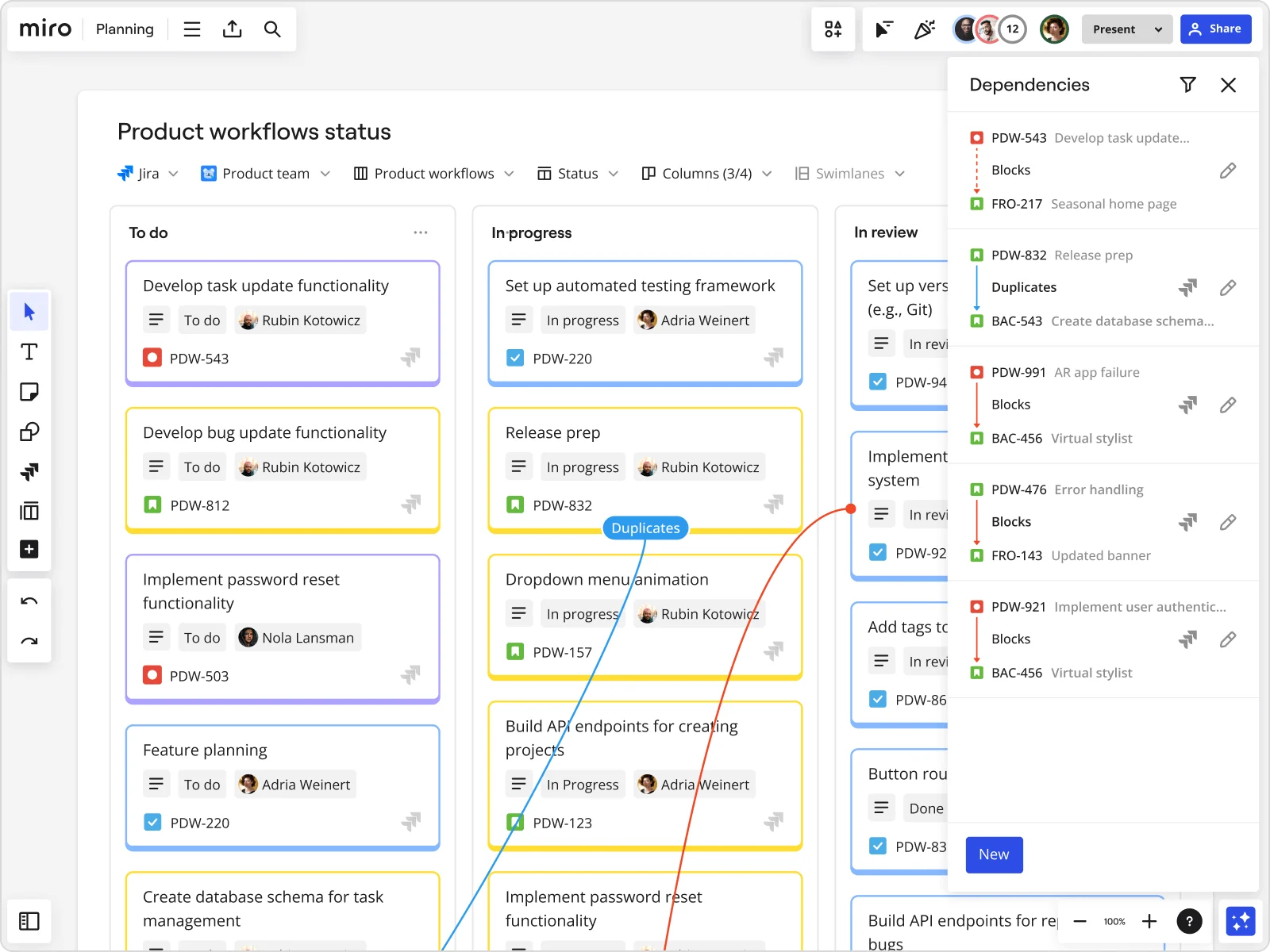
Table of contents
Table of contents
What is product lifecycle management?

What is product lifecycle management? Everything you need to know
Product lifecycle management (PLM) isn’t just a process—it’s the strategic backbone that guides products from the drawing board to their sunset. Whether you’re launching a cutting-edge SaaS product or refreshing an existing feature, understanding PLM can make or break the success of your product. It helps you organize, manage, and control each phase of your product’s journey, ensuring that every step is executed with precision and that the product continues to deliver value throughout its lifespan.
So, what is PLM exactly? Let’s break it down in a way that’s easy to understand and actionable, so you can implement it right away and see real results.
Product lifecycle management explained
Product lifecycle management is a comprehensive framework that oversees every stage of a product’s existence, from the first spark of an idea to its eventual retirement. At its core, PLM connects teams, processes, and data, ensuring that everyone involved in the product’s creation is aligned. The goal of PLM is to manage the product efficiently through its various phases, ensuring that it meets market needs, stays on budget, and delivers continuous value to users.
PLM touches every department involved in product development—from product management and UX design to marketing and customer support. It requires seamless collaboration, clear communication, and the ability to anticipate and respond to challenges. For product managers, PLM is a way to streamline these efforts, mitigate risks, and maintain a clear view of the product’s status at all times.
When implemented correctly, PLM can:
Reduce time-to-market
Improve product quality
Enhance collaboration across teams
Control costs and budget overruns
Help you make informed, data-driven decisions at every stage
Now, let’s dive into the five key stages of PLM.
Product lifecycle management stages
Every product goes through a series of distinct stages, each with its own objectives, challenges, and critical actions. Let’s take a closer look at these stages:
1. Concept and ideation
This is the stage where ideas are born. It’s the brainstorming phase, where product teams explore various concepts, identify potential problems to solve, and begin shaping the initial vision of the product. Market research, competitive analysis, and customer feedback often play a key role here, helping teams zero in on ideas with the most potential.
During this phase, it’s important to keep an open mind, gather as much information as possible, and refine the product concept based on user needs and business goals.
2. Design and development
Once the concept is validated, the design and development stage kicks off. This is where the product starts taking shape. UX designers work on wireframes, mockups, and prototypes, while developers begin building the underlying architecture. The goal is to turn the product vision into something tangible that can be tested and iterated on.
Collaboration between design and development is crucial during this phase. Teams will need to constantly test, refine, and update the product as new challenges and opportunities arise.
3. Testing and validation
Before launching a product, it’s vital to ensure that it works as expected. The testing and validation stage is all about stress-testing the product—identifying bugs, fixing usability issues, and gathering feedback from test users. This phase includes both internal quality assurance (QA) and external testing, such as beta tests with real users.
Validation helps ensure the product meets customer expectations and is ready for market. It’s essential to have clear testing criteria and to remain open to making changes based on feedback.
4. Launch and maintenance
Once the product has passed testing, it’s time for the big moment—the launch. The product is released to users, accompanied by marketing efforts and a solid support plan. But launching a product isn’t a “set it and forget it” process. Ongoing maintenance is key. Teams must continue monitoring product performance, responding to customer feedback, and rolling out updates to ensure the product stays relevant and competitive.
5. End of life
At some point, every product reaches the end of its lifecycle. Whether due to evolving market conditions, new technologies, or changing customer needs, product managers must prepare for the eventual retirement of the product. The end of life phase involves phasing out the product, ensuring customers are informed, and transitioning resources to new projects. It’s also an opportunity to gather insights and learnings that can be applied to future product development efforts.
Why you need to know about product lifecycle management
Understanding product lifecycle management (PLM) is critical for any product manager looking to create high-quality products that evolve with market needs. Here’s a deeper look at why PLM is so important and the benefits it brings:
1. Streamlined collaboration across teams
One of the biggest challenges in product development is ensuring that everyone—from UX designers to developers to marketers—is aligned. PLM provides a structured framework that keeps everyone on the same page, with clear responsibilities, timelines, and goals. By creating a shared understanding of what needs to happen and when, PLM reduces the risk of miscommunication and ensures smoother handoffs between teams.
2. Improved product quality and customer satisfaction
A well-managed product lifecycle ensures that quality checks are built into every stage. From testing prototypes during development to gathering real-time feedback after launch, PLM encourages teams to focus on continuous improvement. This results in products that are better aligned with user needs and have fewer bugs and performance issues—ultimately improving customer satisfaction and loyalty.
3. Shortened time to market
PLM helps reduce bottlenecks by providing a clear roadmap for each stage of product development. By identifying and managing dependencies early, PLM allows teams to move faster, ensuring that products get to market in a timely manner. The ability to quickly pivot when necessary is especially important in fast-moving industries like SaaS, where agility can make or break a product’s success.
4. Reduced costs and better resource management
With PLM, you have better visibility into the entire product development process, which helps with budgeting and resource allocation. By identifying potential risks and challenges early, teams can avoid costly delays or redesigns. PLM also helps prioritize the right features and enhancements, ensuring that development resources are focused on what will deliver the most value.
5. Enhanced decision-making through data
At every stage of PLM, teams gather data—whether it’s customer feedback during ideation or performance metrics after launch. This data informs decision-making, allowing product managers to optimize the product roadmap, allocate resources wisely, and pivot when necessary. PLM’s structured approach to data collection and analysis ensures that decisions are based on real insights, not gut feelings.
How Miro helps you manage every stage of the product lifecycle
Miro’s innovation workspace supports every phase of the product lifecycle, providing teams with the tools they need to collaborate effectively, streamline processes, and drive innovation. Let’s take a look at how Miro’s capabilities align with each stage of PLM:
Concept and ideation
At the ideation stage, Miro’s AI-driven capabilities like mapping, clustering, and content generation help teams organize and evaluate ideas quickly. With Miro Assist, teams can leverage AI-powered suggestions to refine concepts and visualize potential solutions, making it easier to move from idea to action.
Design and development
Miro’s collaborative wireframing tools allow teams to design and iterate in real-time or asynchronously. Whether it’s creating mockups or refining product features, Miro supports seamless collaboration between designers, developers, and product managers. Dependency mapping helps you visualize relationships between different features and teams, ensuring that everyone is aligned, and no work falls through the cracks.
Testing and validation
During testing and validation, Miro’s real-time data visualization tools provide clear insights into testing results, user feedback, and bug tracking. Integrations with tools like Jira allow teams to sync tasks and bug reports effortlessly, ensuring that all relevant data is accessible in one place. This reduces back-and-forth between platforms and speeds up the testing and iteration process.
Launch and maintenance
Miro’s visual project management features like Kanban boards and smart cards keep teams organized during launch. With two-way sync to project management tools like Jira and seamless integrations with communication platforms like Slack and Microsoft Teams, Miro ensures that everyone stays in the loop. Workshop facilitation tools also make it easier to run retrospectives and ensure that post-launch feedback is captured and acted on.
End of life
When it’s time to retire a product, Miro’s Talktrack feature allows teams to document and share retrospectives asynchronously. Product managers can record video or audio walkthroughs of the product’s lifecycle, capturing important insights and learnings for future projects.
Get inspired with some of our product management templates
Miro offers a range of templates that are designed to help product teams at every stage of the product lifecycle. Here’s a look at some key templates that can supercharge your process:
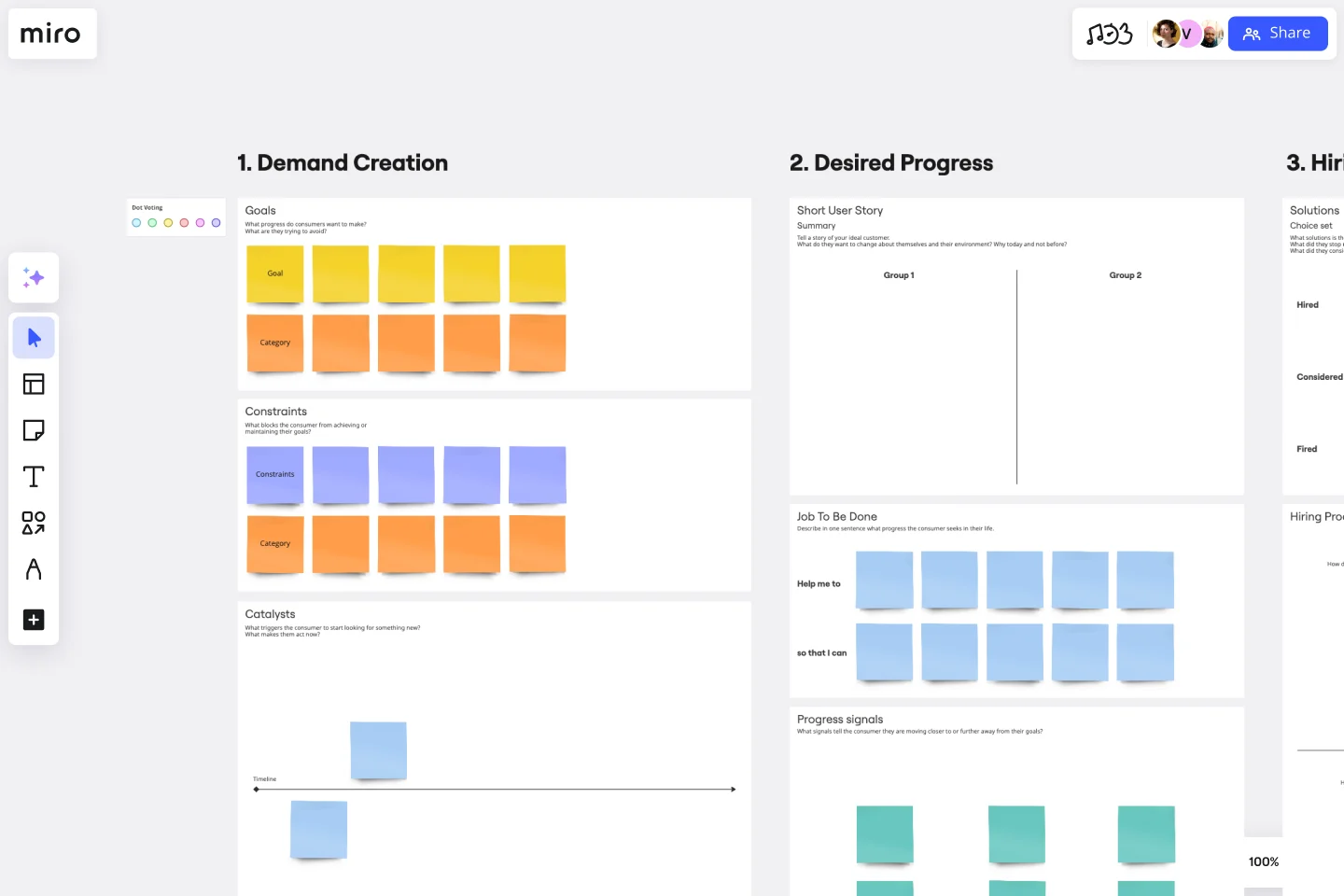
Jobs to be done (JTBD): Use this template to identify the core jobs your customers need to accomplish. This helps frame product decisions around what your users are truly trying to achieve.
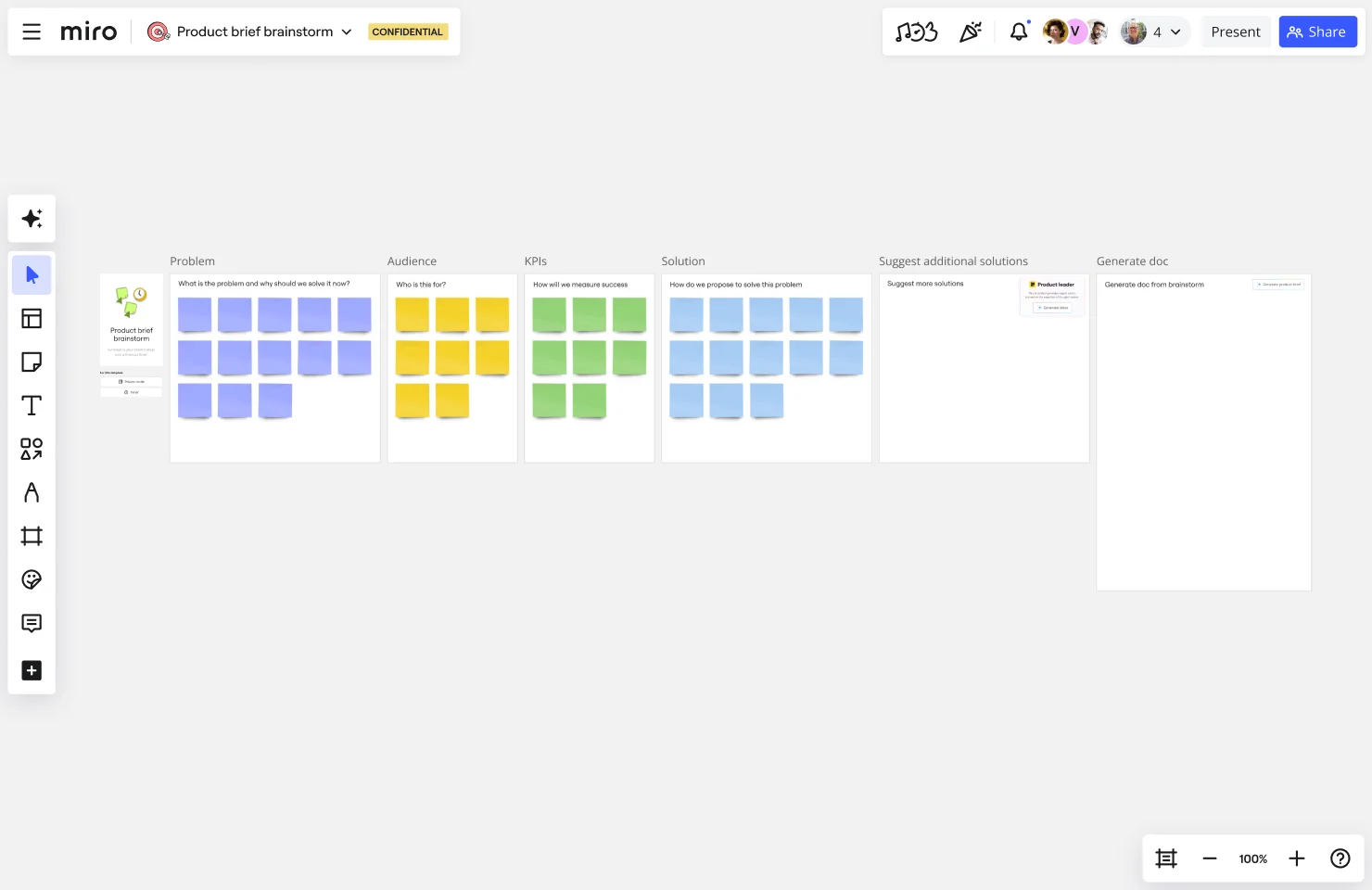
Product brief brainstorm: Perfect for organizing your thoughts and key insights during the ideation phase. This template allows teams to define product attributes, goals, and potential challenges in one collaborative space.
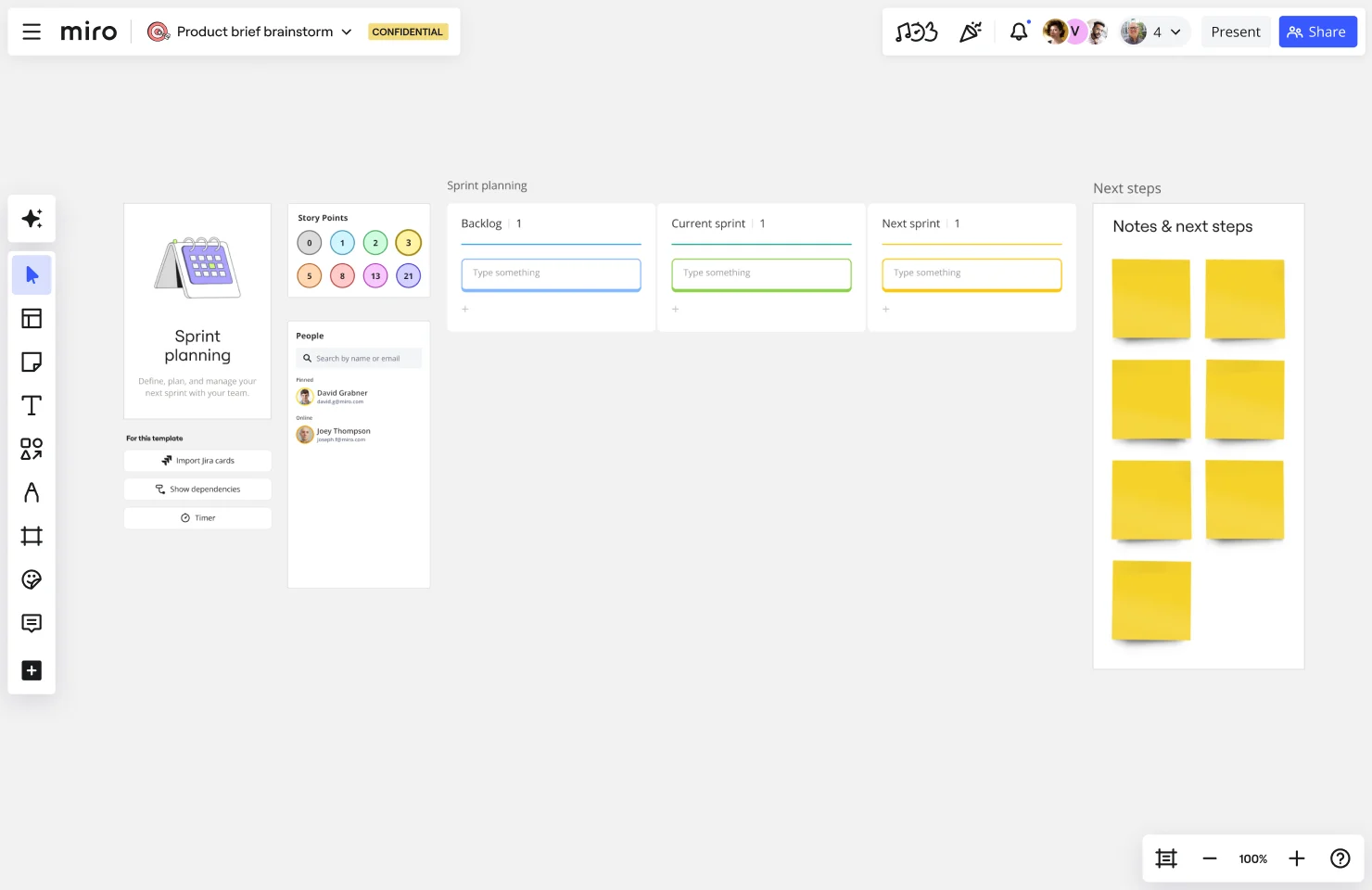
Sprint planning: These sprint planning templates is essential for development teams looking to map out their sprints, prioritize tasks, and assign responsibilities effectively.
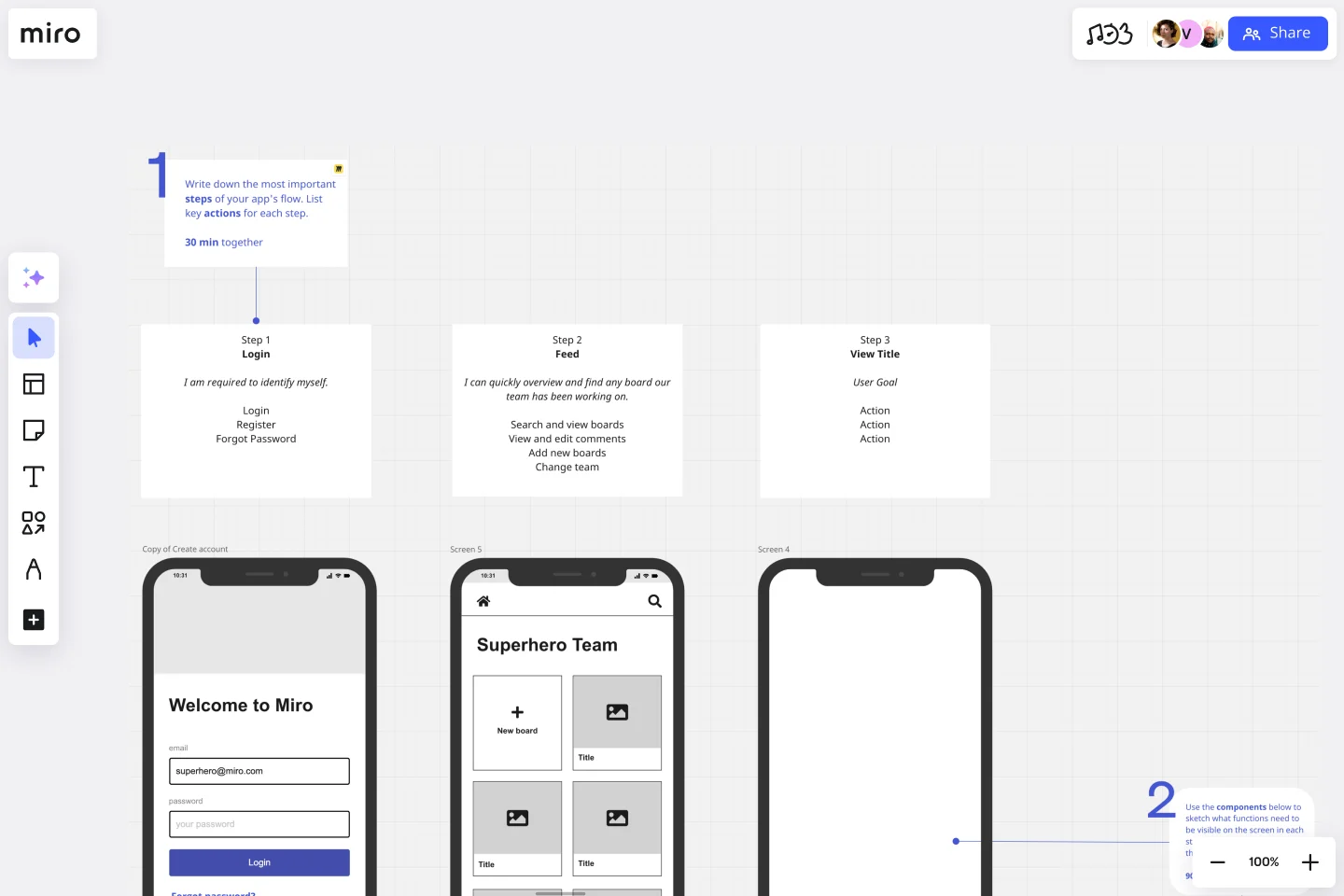
App wireframe: Ideal for early-stage product design. Teams can sketch, iterate, and refine their app wireframes, ensuring a smooth transition from idea to prototype.

Roadmap planning: This template helps product managers map out long-term strategies and communicate key milestones and deliverables to stakeholders.
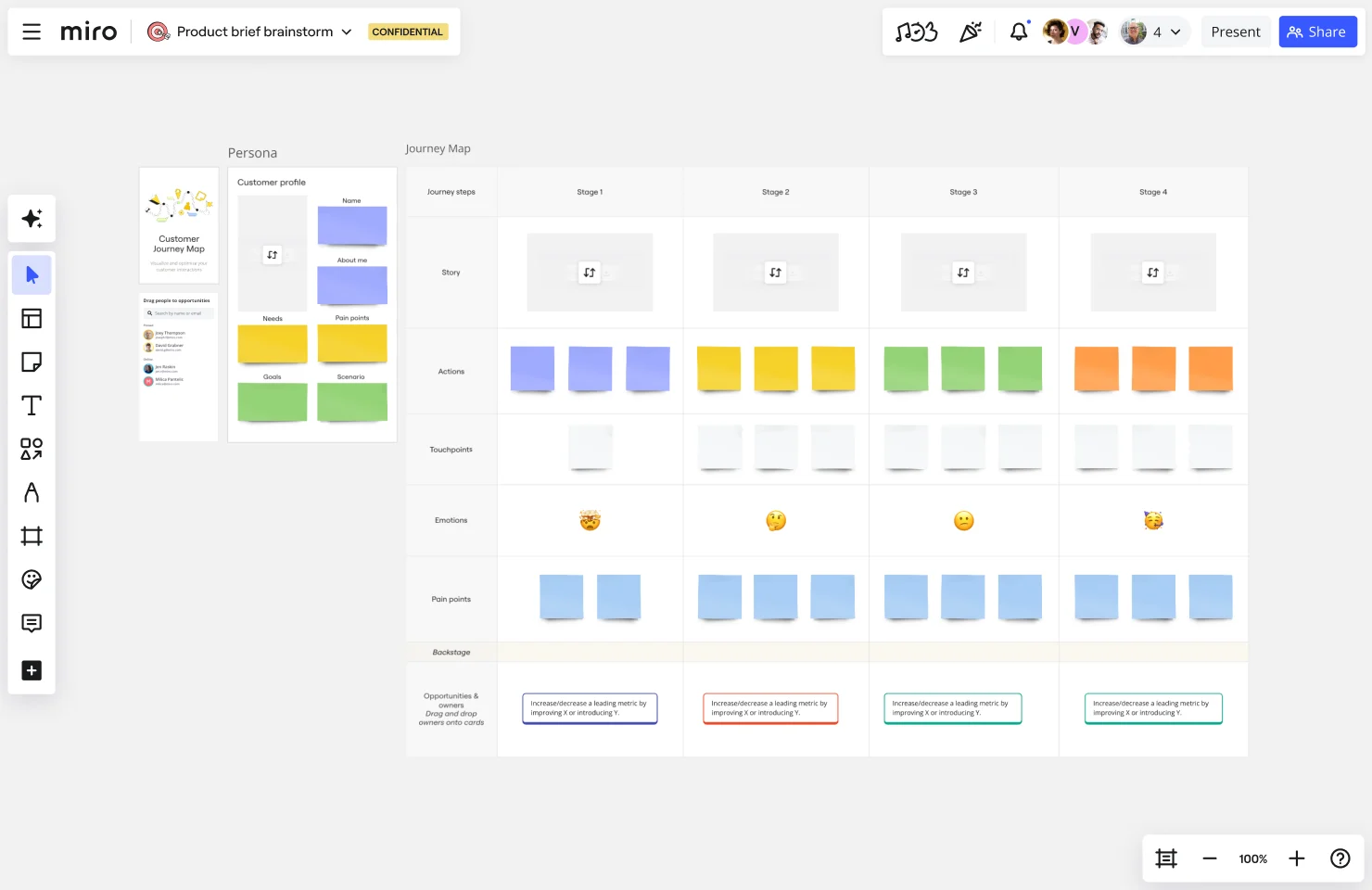
Customer journey map: Visualize your customer’s journey with your product, identifying pain points and opportunities for improvement to create a more user-centered experience.
These templates are designed to make your product lifecycle management process easier, faster, and more collaborative.
Take your product to the next level with Miro
Mastering product lifecycle management is critical to building and sustaining successful products in today’s fast-paced world. With Miro, managing every stage of the lifecycle—from ideation and development to launch and beyond—becomes easier, more collaborative, and more efficient. Miro provides a unified workspace where product managers, designers, and developers can come together to turn ideas into reality, make informed decisions, and keep the product lifecycle running smoothly.
Key takeaways from this article:
PLM is a framework that helps teams manage every phase of a product’s lifecycle, ensuring efficient collaboration and decision-making.
Miro’s AI-driven tools, collaborative wireframing, dependency mapping, and real-time data visualization features align with the key stages of the product lifecycle.
The right product management templates can simplify complex processes, from sprint planning to customer journey mapping.
Product lifecycle management isn’t just about launching a product—it’s about ensuring the product continues to deliver value throughout its entire lifecycle.
Ready to take your product lifecycle management to the next level? Try Miro today and see how our innovation workspace can help streamline your workflows and make every stage of product management a success.